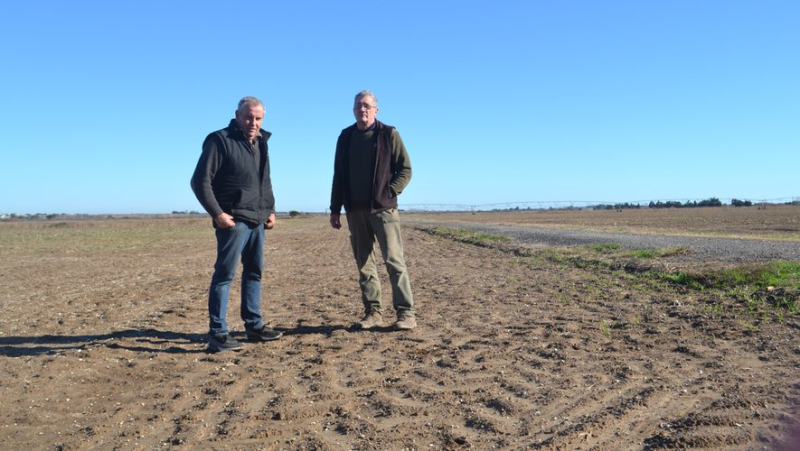“If we do nothing, it is our land that is dead”: the distress of farmers in the lower Orb plain

Paul Rouquette et Benoît D'abbadie : “On n'a aucune visibilité”. Midi Libre – Mélissa Alcoléa
Two farmers, Benoît d'Abbadie and Paul Rouquette, provide the catastrophic results of their 2023 season which ended in a colossal and unprecedented loss of crops due to rising salt in their plots. They express their questions for the future and the impasse in which they find themselves.
Benoît d'Abbadie's gaze wanders towards the horizon. It must be said that the land covered with his eyes is virgin. In the lower plain of the Orb, in the commune of Sérignan, some farmers pay dearly for the vulnerability of their plots located in an area which is subject to rising salt via the river. "Before, there was wheat, rapeseed, corn, seed corn, canned tomatoes here. Last year, there was still durum wheat, nothing there. We pass the crusher, we leave clean…" Owner of 85 hectares in the area, Benoît d'Abbadie had to resolve to not'en& nbsp;cultivate only half… "I've taken it easy, I have less courage."
At his side, his neighbor Paul Rouquette faces an even more critical assessment. A farmer here since 2008, he had never experienced this. He bought 65 hectares at the end of the 2000s. "In 2012, I' I installed a pivot irrigation system to continue making seed corn", as its predecessor practiced for several decades. "The first years, the performance was correct. Then it got worse from 2019-2020, the yield started to fall. We were looking for the problem. We saw the spots in the fields and quickly understood that the salt was coming up…" " ;Despite the addition of water, we were unable to compensate for evapotranspiration and the rise of salt." It must be said that the area was cultivated following the land consolidation decided with the Racine project, in the 1960s, but before then, it was salt meadows.
"We decided to stop the fees"
"In 2021-2022, it was complicated. In 2023, I lost my entire seed corn crop. There was so much salt that the plant was suffocated. I had brought organic matter, manure from the equestrian center, compost… It wasn't enough. And what's more, the summer was very hot", explains Paul Rouquette. Result: 17 hectares of seed corn were lost. And on 20 hectares of corn, 25 quintals were harvested instead of 80, or only a third of the usual yield. A loss of around €100,000. Without comprehensive insurance (but salt would still have to be considered as a risk in the contract). "We therefore decided to stop the costs& nbsp;with the Maison des semences (Aveyron)". Just like growing corn. Other options: durum wheat, barley…"I just set up a soft wheat part to see how it behaves. It's a semi at the beginning of December but we're already seeing problems, it should be outside", he said, while showing the gypsum brought in (limestone crushed) to counter sodium.
Bitter, the farmer feels that he is not being helped: "To bring down the salt sheet, the ditches must be emptied, via pumps, in the Maïre lifting station. By the weight of the water, the salt evacuates". However, pumping is not carried out correctly. "We want to try flooding (to wash the land via BRL Editor's note) but behind it we have to ;#39;we evacuate". The operation also has a significant cost.
"I have dirt sticking to my shoes"
He is now wondering about the best crop strategy to adopt for the future, while he is associated with his son. "Future generations, what will they be able to do on these lands ? Sell ? It will be the last resort but we didn't come here to leave . I have dirt sticking to my shoes. And then who will come and buy ? We won't get back what we paid at the start (around 7,000 € per hectare)."
"We have no visibility, we ask ourselves a lot of questions, we can't find a solution", continues Benoît D'Abbadie. Financially, situations are becoming tense. "A neighbor threw in the towel at the cereal". "The idea is to get things done. Today, if we do nothing, it is our lands that are dead."
A challenge for 300 farms located in the lower Orb plain
Benoît d'Abbadie is the vice-president of "the'Intercommunal Association for the Protection and Preservation of the Lower Plain of Orb& ;quot;, with 230 members, and which defends an anti-salt dam project on the Orb to prevent the rise of salt in the river and thus protect land and agricultural areas . The lower Orb plain accommodates 2,800 hectares of agricultural land, including 1,500 hectares of vines, from Sérignan and Valras to Sauvian, Béziers, Villeneuve-lès-Béziers, Cers and Portiragnes. 300 agricultural operations are located there, generating some 1,500 direct and indirect jobs. And representing 40 million euros in turnover.
I subscribe to read more




